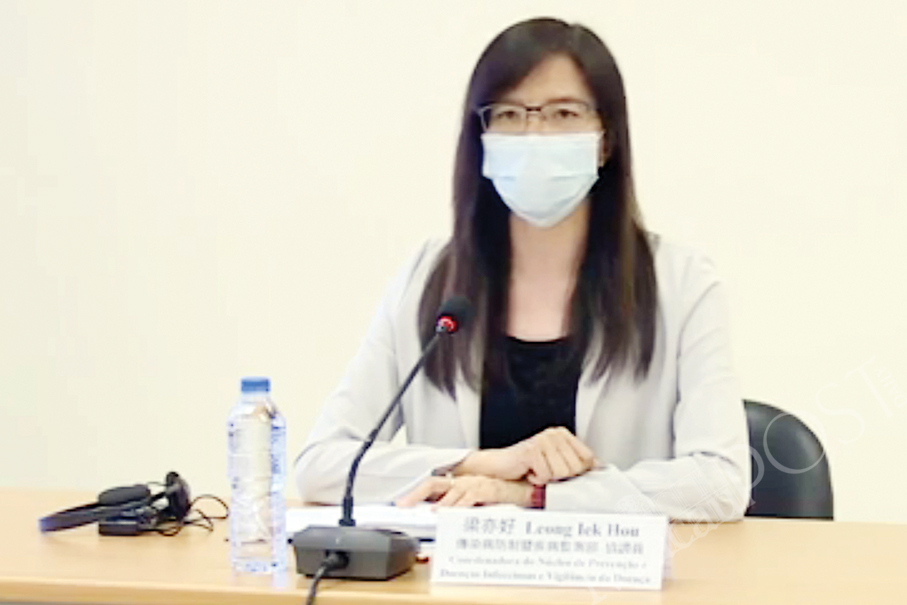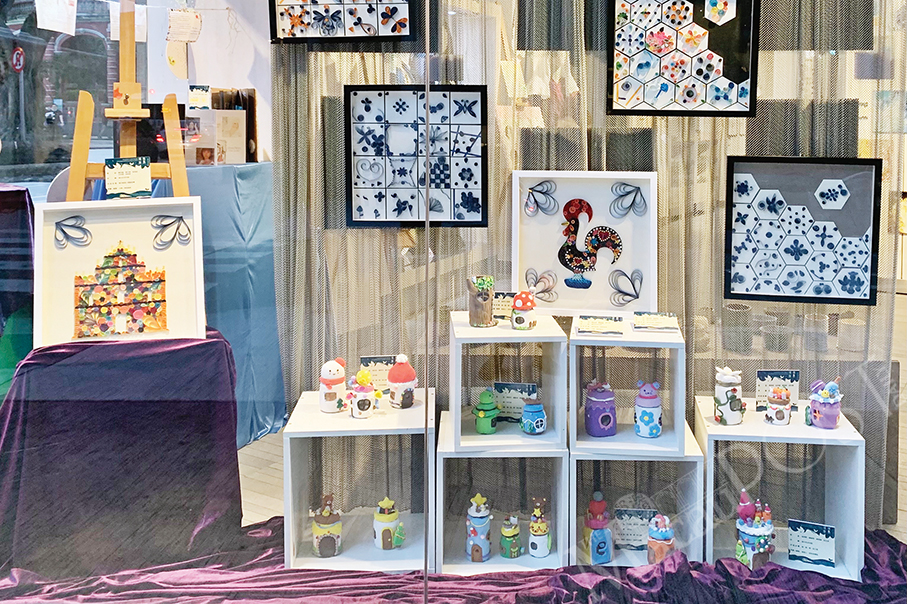Addressing yesterday’s regular press conference by the Novel Coronavirus Response and Coordination Centre, the Health Bureau’s (SSM) Control of Communicable Diseases and Surveillance of Diseases Department Coordinator Leong Iek Hou announced that the Macau government has toughened its COVID-19 measures for all arrivals who have been in Xinjiang or Liaoning within 14 days prior to their entry into Macau, in response to the latest development of the COVID-19 epidemic in the north-western autonomous region and north-eastern province.
According to data from the National Health Commission (NHC), the Xinjiang Uygur Autonomous Region has confirmed new local COVID-19 cases every day since around the middle of this month, while Liaoning province has recorded new local cases every day since Wednesday last week. The number of new local COVID-19 cases confirmed daily in both areas has been increasing during the period, according to NHC data.
When asked during yesterday’s press conference whether the Macau government will implement additional COVID-19 measures for arrivals from Xinjiang and Liaoning, Leong said that the Macau Health Bureau (SSM) has been closely assessing the development of the two areas’ COVID-19 epidemic and maintaining close communication with the National Health Commission on the matter.
‘Medium-risk’ areas
Leong said that the Macau government has classified Xinjiang and Liaoning as “medium-risk” areas, adding that therefore upon arrival in Macau the Macau Health Code of travellers who have been in Xinjiang or Liaoning within the past 14 days will now indicate yellow.
Upon arrival in Macau, Health Bureau officials will particularly assess the travellers’ health status, such as checking whether they have any COVID-19 symptoms and asking them whether they have been in contact with confirmed COVID-19 patients in the two areas, Leong said, adding that those who have any of the two conditions will be transferred to the public Conde de São Januário Hospital Centre for further medical examination and a COVID-19 test.
Leong also said that the Macau government now has stricter requirements for the nucleic acid test (NAT) certificates to be presented by arrivals from Xinjiang and Liaoning. Those who present a NAT certificate which shows that they tested negative for COVID-19 over the previous 72 hours will be immediately taken to the public hospital for a COVID-19 follow-up test, Leong said, adding that they will only be discharged after their negative test results are available.
While arrivals from the mainland do not need to go into quarantine in Macau upon their arrival here, they have to present a NAT certificate confirming that they have tested negative for COVID-19 within the past seven days. Arrivals from elsewhere – namely Hong Kong, Taiwan and foreign countries – must undergo 14 days of quarantine and medical observation at one of the government’s “quarantine hotels” upon their arrival here. Besides, all those arriving in Macau from Hong Kong must present a NAT certificate confirming that they have tested negative for COVID-19 within the past seven days – otherwise they will be refused entry, after which they will still have to undergo the 14-day hotel quarantine here.
‘Self-health management’ required
Leong also said that Health Bureau officials will call arrivals from Xinjiang and Liaoning every other day to understand their latest health status during their stay in Macau. The bureau will also require them to properly practise “self-health management”, such as always wearing a facemask when out and about and avoiding crowds.
When asked about the exact date when the tightened COVID-19 measures for arrivals from the Xinjiang and Liaoning started, Leong revealed that the Macau government started the new measures for arrivals from Xinjiang “shortly after the COVID-19 epidemic emerged” in the autonomous region, while the measures for arrivals from Liaoning started at noon yesterday. Leong did not say when exactly the measures for arrivals from Xinjiang started.
Leong also said that no travellers from Xinjiang and Liaoning have entered Macau since the respective measures by the Macau government took effect.
Meanwhile, Leong also said that the Macau Health Bureau has determined that for the time being the 14-day hotel quarantine measure and the seven-day NAT certificate measure for arrivals from Hong Kong are deemed sufficient to protect Macau from the COVID-19 risk. She was quick to add that the Macau government’s COVID-19 measures for arrivals from Hong Kong “may be adjusted” in line with the latest developments in Hong Kong’s COVID-19 epidemic.
30 HK-Macau cargo ship crew members exempted from quarantine
Meanwhile, Leong said that no more than 30 Macau residents who are crew members of cargo ships plying the Hong Kong-Macau route are currently exempted from the Macau government’s quarantine measure.
Leong underlined that nevertheless the Health Bureau has imposed strict requirements on these crew members, according to which they are not allowed to go ashore when their vessels are in Hong Kong. Goods in Hong Kong are only loaded on to the ships by mechanical devices, the ships then transport the goods to Macau, Leong said, adding that Hong Kong people are not permitted to board the Macau-bound ships.
Leong pointed out that the crew members have to be tested for COVID-19 every seven days.
Payment counter axed
Meanwhile, Alvis Lo Iek Long, a clinical director of the public Conde de São Januário Hospital Centre, said during yesterday’s press conference that the Health Bureau has removed the payment counter at its NAT programme’s main testing station in the Taipa Ferry Terminal in Pac On, which was set up in early May, considering that most of those undergoing their nucleic acid tests now choose to pay the testing fee of 180 patacas online when making an appointment online for the tests. According to Lo, the Health Bureau has not set up payment counter at the new testing station in the Macau Forum complex in Zape, which went into operation last week.
Lo pointed out that those who have made an appointment for a nucleic acid test but cannot pay online can choose to pay the fee at the bureau’s health centres, heath stations and the public hospital before or after they have had their sample collected at either of the two testing stations.
Lo underlined that the cancellation of the payment counter at the Pac On testing station aims to prevent crowds there so as to reduce the COVID-19 risk. Lo also said that the fact that a resident has still not paid the testing fee after they have had their sample collected will not delay the time when their negative test results are displayed on their Macau Health Code, adding that this would only prevent them from making an appointment for a nucleic acid test next time.
Meanwhile, Lei Tak Fai, who heads the Public Relations Division of the Public Security Police (PSP), said during yesterday’s press conference that 3,600 and 4,000 visitors entered and left Macau on Sunday respectively.
According to Lo, Macau has not recorded a new COVID-19 case for 31 days, while no local case has been confirmed for 120 days. All 46 novel coronavirus disease patients have been discharged from hospital. A total of 44 of the cases have been classified by the Health Bureau as imported, while two cases have been classified as “connected to imported cases”.

Health Bureau (SSM) Control of Communicable Diseases and Surveillance of Diseases Department Coordinator Leong Iek Hou addresses yesterday’s press conference about the city’s novel coronavirus (COVID-19) situation. Photo: GCS







